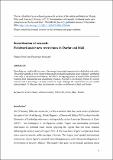Securitisation of research : fieldwork under new restrictions in Darfur and Mali
Abstract
Knowledge on conflict-affected areas is becoming increasingly important for scholarship and policy. This article identifies a recent change in knowledge production regarding 'zones of danger', attributing it not only to the external environment, but also to an on-going process of securitisation of research resulting from institutional and disciplinary practices. Research is increasingly framed by security concerns and is becoming a security concern in itself, although the implications are not readily acknowledged. To illustrate these developments, we draw on fieldwork in Mali and Darfur.
Citation
Peter , M & Strazzari , F 2017 , ' Securitisation of research : fieldwork under new restrictions in Darfur and Mali ' , Third World Quarterly , vol. 38 , no. 7 , pp. 1531-1550 . https://doi.org/10.1080/01436597.2016.1256766
Publication
Third World Quarterly
Status
Peer reviewed
ISSN
0143-6597Type
Journal article
Description
This work was supported by the Norges Forskningsråd [grant number 238066].Collections
Items in the St Andrews Research Repository are protected by copyright, with all rights reserved, unless otherwise indicated.

